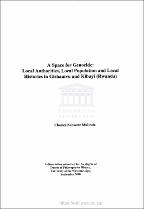| dc.description.abstract | Soon after the Tutsi genocide in Rwanda, in 1994, research around this horrific event flourished. Although a variety of authors of different expertise (journalists, human rights activists, witnesses, academics, both Rwandans and foreigners) produced a great deal of literature, it is mostly scholars who had conducted research in Rwanda prior to 1994 who after 1994 took the lead in the endeavour to write about this genocide. Certain of these scholars produced serious work that has advanced our knowledge about it. These include anthropologists, political scientists, historians, sociologists and economists. As their prior research had brought them close to Rwanda, they felt the need and the moral obligation to contribute to the understanding of this genocide. This serious literature has increased our understanding with regard to a number of problems. It has for instance challenged the view that the genocide was the result of popular anger following the death of President Habyarimana in the plane crash of April 6h,lgg4.It has rejected the western journalistic view of the war and genocide in Rwanda
as a result of innate and secular "tribal" conflict and confrontation between the Hutu and the Tutsi. Most importantly, it has advanced knowledge about the causes,2 the making of the genocide at the national level,3 and at some local levels. In this respect, it has to some extent analysed the contexts of the genocide from the politicals economic,and social T and culturals perspectives. ln establishing the context of the genocide, many authors have turned to the whole history of Rwanda in order to understand the genocide. some extent analysed the contexts of the genocide from the political,s economic,6 social and culturals perspectives.e ln establishing the context of the genocide, many authorshave tumed to the whole history of Rwanda in order to understand the genocide. | en_US |

